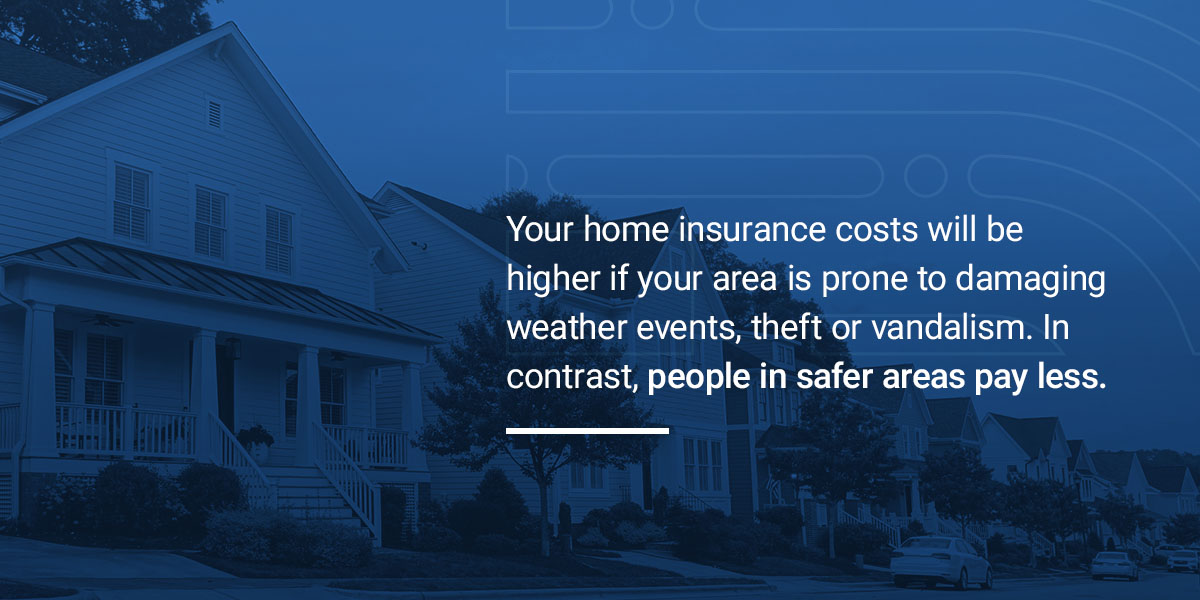
Home is where you lay your head. As a homeowner, you want peace of mind when you do so. Home insurance is a smart financial way to secure your home from risks, though insurance rates vary.
Most American homeowners prioritize home insurance, with nearly 90% purchasing coverage for their properties. However, the costs of these policies are almost as diverse as the people who buy them.
To understand why home insurance premiums vary so widely and ensure you get the best insurance deal for your home, you need to know the factors that influence home insurance pricing. Discover 10 factors affecting home insurance costs and how to get the lowest prices.
The better your home’s condition, the more affordable your premiums will be.
It’s crucial that your home meets your state and local building codes and that its structure and key components are in good shape. Roofing, plumbing and electrical components are especially important to get in order.
Since these elements degrade with age, premiums tend to be higher on older homes. If your home is older, consider upgrading it to meet today’s safety standards.
Replacement cost is different from market value. It describes how much it would cost to rebuild your entire home using materials similar in kind and quality.
This cost is crucial in calculating your premiums because it gives you and your insurance carrier a valuation of the rebuilding expenses in a worst-case scenario. By considering it, insurance providers can provide sufficient coverage for those with more expensive homes without overcharging people with less expensive homes.
Location has a major impact on home insurance premiums. It can raise or lower them and indirectly affect insurance rates by influencing other factors.

Your home insurance costs will be higher if your area is prone to damaging weather events, theft or vandalism. In contrast, people in safer areas pay less. Living near a fire station can bring your premiums down further.
Location can also influence other factors like replacement cost. If materials and labor cost more in your area, your replacement cost will be higher. This will increase your insurance costs.
For example, Missouri’s frequent adverse weather events put it on the higher side of home insurance costs than other states. However, Missouri’s home insurance prices are still more affordable than several other states. Your location within Missouri could put you higher or lower than the state average premiums depending on factors like your neighborhood’s safety and how near you are to your local fire department.
The fewer home insurance claims you’ve made in the past, the more affordable your insurance will be today.
Every time you make a claim, it may affect the provider’s assessment of how risky it is to cover your home. In addition to any claims you’ve made on your current home insurance, providers can check claims you filed on previous homes, even if you were covered by a different insurer. This data is available on your Comprehensive Loss Underwriting Exchange (CLUE) report.
This means you can keep your premiums low by handling repairs out of pocket if you can comfortably afford them.
Within your insurance cost breakdown, there’s a trade-off between your deductible and your premium. Raising one will usually lower the other and vice versa.
The deductible is the amount you contribute out of pocket when you make a claim on your insurance. When you agree in advance to a higher deductible, you will likely have lower monthly premiums because you are asking less from the insurer in the event of a claim. Since you will only receive funds for losses exceeding your deductible, you may also be better prepared to cover small repairs out of pocket, improving your claim history.
At the same time, set a deductible you can afford. After all, home insurance aims to give you peace of mind and secure your assets. Only consider a higher deductible if you’re confident you can manage it.
Certain investments in your home’s safety and security can help reduce insurance costs. Making your home safer reduces risk and justifies lower insurance rates. Examples of protective features that could help you save on insurance include:
In many states, including Missouri, it is legal and common for insurance companies to check your credit history when assessing the risks of insuring your home.
If you have a good credit score, this may reduce your insurance costs. However, if your credit score is low, many insurance companies will make a statistical judgment that you are more likely to claim and riskier to insure, resulting in higher insurance rates.
Many home insurers offer special discounts and incentives that can reduce your costs. The most common are discounts for having multiple policies with the same company or bundling policies like home and auto insurance together.
Ask your insurance provider about the home insurance discounts they offer.
Several unusual factors may impact what an insurer will charge you. You may find some of these surprising:
All the factors we’ve discussed so far relate to you or your property. However, different home insurance policies also have different costs.
Generally, the more comprehensive the coverage, the more you’ll pay for it. Insurers often have different types and tiers of home insurance, so you can choose a policy that fits your needs and budget. When comparing your options, consider what’s important to you and what you can afford.
At the same time, different providers have their own rates, even when creating a quote for the same person and property for comparable policies. Compare quotes, and choose an insurer that offers you the best rates for the coverage you need.
With all these factors affecting home insurance costs, the options are broad and potentially bewildering. David Pope Insurance finds you the lowest rate on the market for home insurance coverage that gives you peace of mind.
Our family-owned, local Missouri insurance firm responds with fast, flexible, quality insurance quotes the same day you contact us. Submit a request for a quote, and we’ll find you the most affordable insurance and answer your questions within hours.